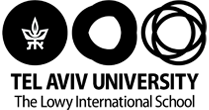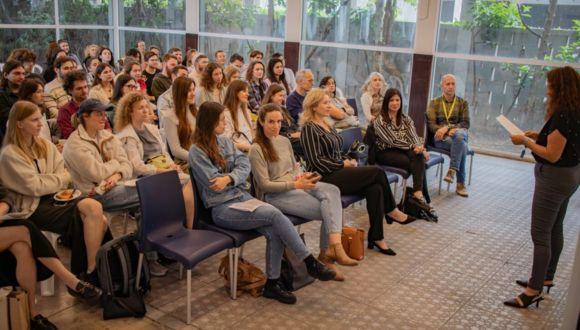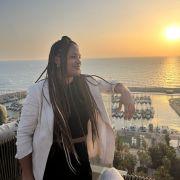A Deep Dive into Language, Culture, and Academic Preparation at Tel Aviv University
New cohort starts TAKA at Tel Aviv University
On April 7, over 70 Olim students gathered at the Lowy International School to start their TAKA studies. The four-month program offered at Tel Aviv University in cooperation with the Israeli Student Authority includes intensive Hebrew and English classes, as well as several optional courses.
While not mandatory, TAKA is quite popular among Olim students as it provides an opportunity to enhance Hebrew proficiency, facilitating enrollment in Hebrew-taught programs at Israeli universities.

Boris Gail, one of TAKA instructors, talks about Yael preparation classes
Language Classes and Much More
Alongside language instruction, TAKA offers numerous valuable opportunities: students can work on their academic writing, prepare for Yael test for Hebrew proficiency, and Amir test for English proficiency, and take courses in tailored to various subject areas. With different tracks available, students can select the option that best aligns with their academic interests.
On top of that, TAKA students enjoy a rich array of social activities. From career workshops to cultural excursions, students explore career opportunities, visit iconic destinations like Jerusalem and the Dead Sea, and engage in thoughtful discussions. Celebrating holidays together fosters community spirit and helps build long-lasting connections.
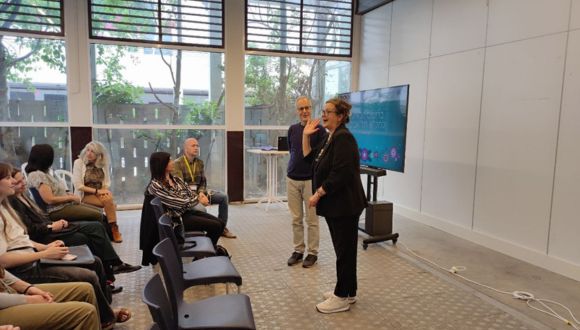
Ron Cohen and Ronnie Ashkenazi talking to the students
But TAKA is not only about studying the language. Ron Cohen, who teaches advanced Hebrew, also runs a course on Israeli Culture that touches on literature, poetry, and cinema. “Our students are going to live here and be part of the society—they should get to know the culture and Israeli society, which is very diverse, and we’re going to do that through watching movies, reading short stories and poetry, and so on,” comments Cohen.
Students taking this course will be reading short stories by modern Israeli authors, such as Etgar Keret or Savyon Liebrecht, to get to know the topics that Israeli literature deals with.
“It’s all part of the Hebrew language. Language is all about culture.”— Ron Cohen
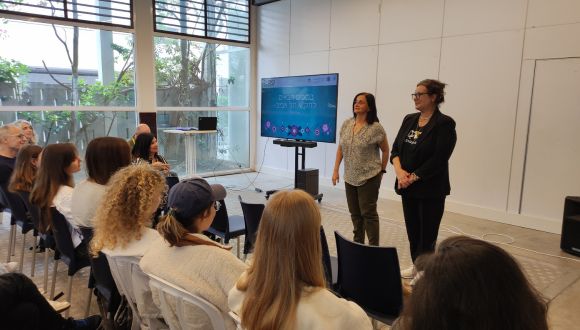
Anat Levy Schraiber and Ronnie Ashkenazi
Anat Levy Schraiber will be working with the upper-intermediate group. She also teaches an Actualia course that focuses on TV and newspapers, exposing students to current events through reading and watching the news in Hebrew.
‘It’s important, especially now when we are at war, to be able to understand the news and to learn topic-specific words.”—Anat Levy Schraiber
TAKA is very intense—classes run every day for four months, but the benefits are obvious. As Schraiber states, students finishing the program will “understand the Israeli society, where they are, and how to study at university in Israel. They will also learn the necessary vocabulary.” Those who wish to continue studying Hebrew after TAKA have the option of enrolling in TAU Ulpan which is offered throughout the year.
Olim from around the World
The current cohort comprises students from different countries, some of whom made Aliyah just a short while ago. Kayla Marks came to Israel from Miami two months ago out of her zionist desire and connection to religion.
“The first weeks were hard, even for somebody like me, who’s been here many times, but now I feel that it’s the best decision I’ve ever made”—Kayla Marks
Marks already has a bachelor’s in International Relations and Middle Eastern Studies and is going to pursue her master’s in Israel, probably in Middle Eastern Studies in Digital and Cyber Spaces. “I would eventually like to go into countering cyber terrorism and radicalism,” she says.
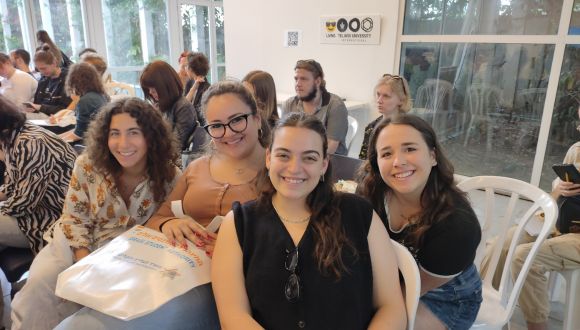
Jillian Naimer, Kayla Marks, Tali Evenstein, and Sophia Peister, TAKA participants
Marks studied Hebrew from kindergarten through her senior year at high school and likes watching Israeli TV, with Fauda, Kupa Roshit, and the Israeili version of the Big Brother being her favorite sources of spoken Hebrew and slang. But she is really excited about the TAKA program:
“It is exactly what I was looking for – I want to bring my Hebrew to an academic level.”—Kayla Marks
Tali Evenstein also made Aliyah a bare two months ago – from Uruguay. She has already been to Israel on several occasions and did her gap year here. Evenstein joined TAKA to be able to do a bachelor’s in Public Relations, which requires a high level of Hebrew.
“I’ve always wanted to make Aliyah — I feel like Israel is my home. I really wanted to be here, so I finally came.”—Tali Evenstein
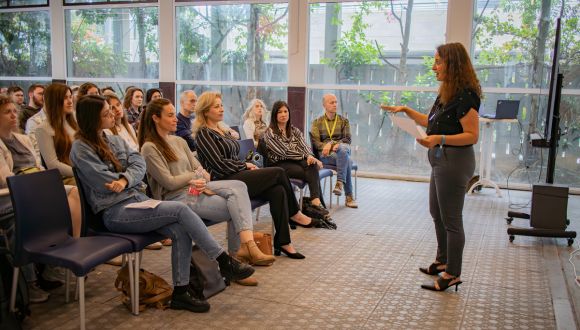
Shoshy Oss -Harari, Israel Student Authority
Sophia Peister, on the other hand, has been living in Israel for almost five years. She moved from the US and has already completed her army service, which helped her integrate into Israeli society.
“Now I feel that my next step as an Olah is to study and to be able to contribute to the country with the degree.”—Sophia Peister
“My Hebrew is fine – I can have a conversation but I always feel that something is missing. And I feel that with TAKA I’ll be able to get over that part and speak confidently. I also think that TAKA will open up different doors so that I see what’s right for me,” says Peister.
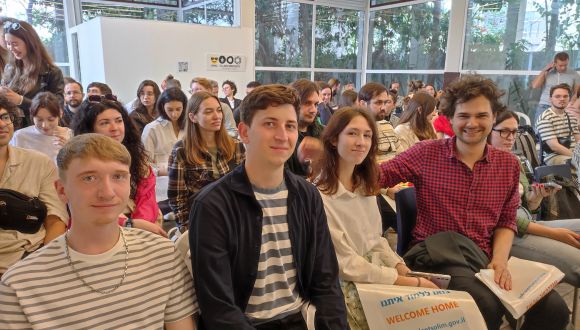
Vladislav Stolpovskii (second from the left) with his friends
Vladislav Stolpovskii, from Russia, who first came to Israel on a MASA program, is looking to boost his Hebrew to continue studying at university – possibly doing a master’s in Middle Eastern studies. He’s also interested in the English course that is part of TAKA.
Jillian Naimer, an Olah from Canada, is looking to do her master’s in psychology next year. Her expectations from TAKA include being to write essays, do presentations in Hebrew, improve her vocabulary, and have more confidence reading.
“Everything important in life is here. It’s been a hard year, obviously, but it has also been amazing.”—Jillian Naimer.
